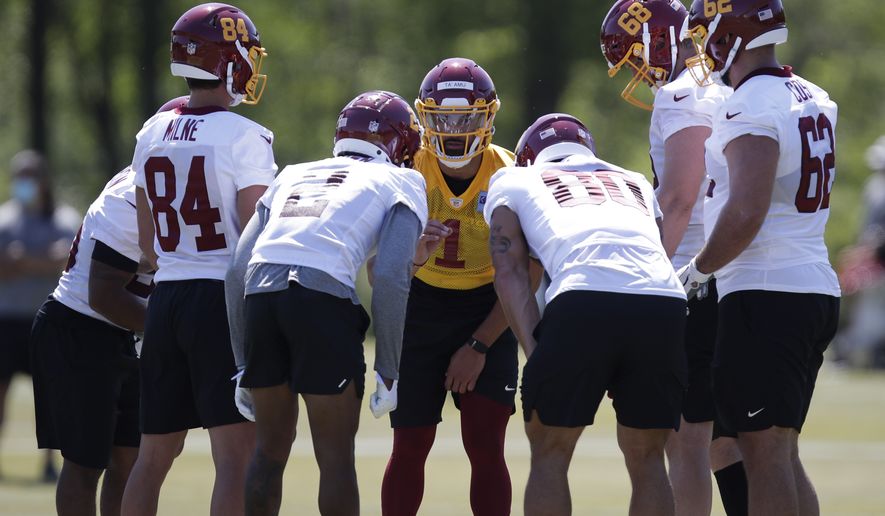ASHBURN — Ron Rivera had some advice for Washington’s rookie class: If you don’t know, ask.
The Washington coach said he wanted players to reach out if they had any questions. He’d rather they do that than carry on and repeat mistakes.
So as Rivera roamed from position to position this past weekend at the team’s rookie minicamp, the coach saw exactly what he was hoping for — first-year players were indeed asking coaches for insight. Perhaps more importantly, Rivera said he saw players digesting that information and applying it on the field.
“It was kind of intriguing to watch some of these young guys in person for the first time,” Rivera said. “You realize that they look different than they do on tape.”
Rivera and his staff are hopeful that this year’s class can come in and have the kind of impact last year’s group did. In 2020, Washington grew over the course of the season in part because younger players began to thrive in bigger roles. Rivera attributed that to the experience learned on the job.
It may not be a coincidence, then, that of the 10 rookies Washington took this year, seven had extensive starting experience in college — perhaps paving the way for an even faster transition to the pro game. The exceptions are first-round linebacker Jamin Davis (11 starts, 25 games), third-round cornerback Benjamin St. Juste (nine starts, 18 games) and seventh-round wideout Dax Milne (three starts, 35 games).
All of Washington’s picks chose to play the 2020 season, despite the pandemic. Rivera said playing through COVID-19 wasn’t necessarily a prerequisite for Washington, but that he said there were players whose stock fell after opting out.
“Guys that did not play, their grades might have been higher if they had played,” Rivera said. “There were a few guys — whether it was this year or last year’s tape — they were going to be graded a specific way. There are a couple guys that we talked about … off of 2019 film, and everybody kind of went ‘Wow, okay.’
“So, there was a little bit of that skepticism as well that might have played into it and might have changed how you graded a guy or how you looked at a guy. For the most part, I think it’s pretty much how it fell.”
Rivera said experience translates at the NFL level. “Football is football, “ he said, and knowing what to do — and when — is a “huge plus.”
Second-round tackle Sam Cosmi, for instance, started 34 games at Texas. He began with the Longhorns at right tackle before making the switch to the left side. That versatility was appealing to Washington, which plans to initially use Cosmi on the blindside.
There is still plenty to learn, however. Cosmi said he has to get used to the speed of the NFL.
Dyami Brown (30 starts at North Carolina) has been working on his intermediate route running. Darrick Forrest (36 starts at Cincinnati) said he’s learning both safety spots in Washington’s defense so he can slot in however the coaching staff wants.
That, naturally, leads to growing pains. Tight end Sammis Reyes, for example, isn’t just learning the NFL — he’s learning how to play football. As a former college basketball player who was signed ahead of the draft to play tight end, the Chilean-born prospect got an earful repeatedly from tight ends coach Pete Hoener.
“He is one of those coaches that is really going to push you, and I think that’s the only way to be coached,” Reyes said. “If you want to get better, you got to have somebody in front of you that’s telling you what you’re doing wrong whenever you do something wrong.”
Reyes said he studies 10 hours per day to learn the playbook. And to help him memorize assignments, Reyes has his girlfriend call out plays at their apartment and the 25-year-old diagrams them on a whiteboard as fast as he can.
Not everyone, of course, is trying to learn the fundamentals like Reyes. But Rivera noted that one of the biggest adjustments for rookies is learning play calls and the verbiage that tends to differ greatly from college.
“They’ve got to be able to translate that so that it computes, and they can go out and make plays and play fast,” Rivera said. “That is the biggest key, so that they won’t be thinking too much.”
• Matthew Paras can be reached at mparas@washingtontimes.com.




Please read our comment policy before commenting.